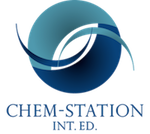- Generality
- Reagent Availability
- Experimental User Friendliness
- Criteria #4
- Criteria #5
-
General Characteristics
The oxidation of alcohols based on the dimethylsulfide-NCS system is known as the Corey-Kim oxidation. The oxidation of primary alcohols stops at the aldehyde oxidation state.
-
General References
・Corey, E. J.; Kim, C. U. J. Am. Chem. Soc. 1972, 94, 7586. doi:10.1021/ja00776a056
・Corey, E. J.; Kim, C. U. J. Org. Chem. 1973, 38, 1233. DOI: 10.1021/jo00946a041
・Corey, E. J.; Kim, C. U. Tetrahedron Lett. 1974, 15, 287. doi:10.1016/S0040-4039(01)82195-X
・Review: Tidwell, T. T. Synthesis 1990, 857. doi:10.1055/s-1990-27036
-
Reaction Mechanism
Dimethylsulfoxide (DMSO) and oxalyl chloride form the active chlorosulfonium species in the Swern reaction. In a similar fashion, dimethylsulfide (DMS) and Cl2 or NCS form the active species.
-
Examples
Alcohols containing a double bond at the β,γ-position sometimes isomerize to form α,β-unsaturated carbonyl compounds.
The formation of the chlorinated byproduct is known[1] in the absence of triethylamine, especially for reactive allyl and benzyl alcohols. The synthesis of an allyl chloride is shown here.[2]
The total synthesis of ingenol.[3]
-
Experimental Procedure
-
Experimental Tips
-
References
[1] Corey, E.J.; Kim, C. U.; Takeda, M. Tetrahedron Lett. 1972, 13, 4339. doi:10.1016/S0040-4039(01)94310-2
[2] Denmark, S. E.; Fu, J. Org. Lett. 2002, 4, 1951. DOI: 10.1021/ol025971t
[3] Tanino, K.; Onuki, K.; Asano, K.; Miyashita, M.; Nakamura, T.; Takahashi, Y.; Kuwajima, I. J. Am. Chem. Soc. 2003, 125, 1498. DOI: 10.1021/ja029226n
-
Related Books
[amazonjs asin=”3527306420″ locale=”US” title=”Modern Oxidation Methods”]
[amazonjs asin=”B00IGYNTAU” locale=”US” title=”Oxidation and Reduction in Organic Synthesis (Oxford Chemistry Primers) by Donohoe, Timothy J. (2000) Paperback”]
[amazonjs asin=”0387236074″ locale=”US” title=”Oxidation of Alcohols to Aldehydes and Ketones: A Guide to Current Common Practice (Basic Reactions in Organic Synthesis)”]


![corey-11[1]](https://assets.en.chem-station.com/uploads/2014/07/corey-111.gif)
![corey_kim_4[1]](https://assets.en.chem-station.com/uploads/2014/07/corey_kim_41.gif)
![corey_kim_5[1]](https://assets.en.chem-station.com/uploads/2014/07/corey_kim_51.gif)